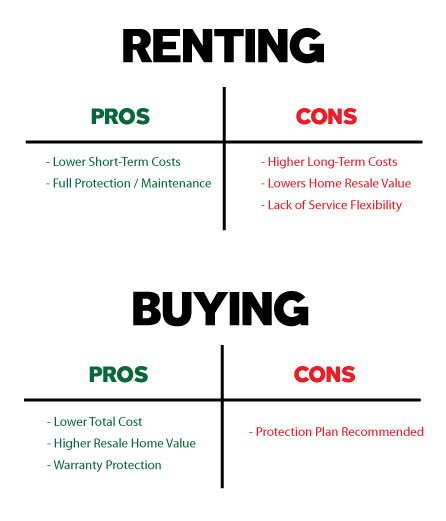Which Option is Better?
When your furnace breaks down it will probably be the coldest day in the winter, so you probably won't have the luxury of tim
There is a growing debate about renting furnaces units; rental water heaters have been common for many years now, however there are an increasing number of companies offering rental furnaces (and air conditioners) in homes.
So which is the better option: Buy or Rent?
Here is some information that may help you with your decision.
RENTING - PROS:
- LESS MONEY PAID UPFRONT: The cost of a new furnace can range from $3500 - $4500. Many people aren't prepared for this expense, so renting instead of buying is an attractive option, as you'll keep more money in your pocket at least in the short term. The monthly costs of a furnace rental are also lower when compared to financing.
- FULL PROTECTION: Many rental programs come with full-coverage protection on all parts and labour. This means you don’t have to pay for service calls, repairs or even a replacement (depending on your contract) in the event your furnace can’t be fixed. Given the amount of use furnaces get in Canada, in addition to the high cost of potential repairs - which can range anywhere from a $200 to well over $1000 dollars for something like a cracked heat-exchanger - having this benefit is an important one. Moreover, some rental contracts include annual maintenance, which helps keep your furnace running smoothly and efficiently throughout the winter.
RENTING - CONS:
- HIGHER LONG-TERM COST: Due to the long-term nature of the rental contracts, when you compare the total cost of a rental verus purchasing or financing, you'll be paying more for your furnace if you rent when all is said and done. Depending on your contract, your total rental cost may be up to double the amount than if you purchased.
- LOWER RESALE VALUE FOR YOUR HOME: Having rental equipment tends to reduce the resale value of your home. Typically, an owned furnace is considered a plus for potential buyers. When a furnace is rented, buyers may not want to assume the existing rental agreement and monthly payments, and as such, they may request that you buyout the contract (which could be very costly for you).
- LACK OF SERVICE FLEXIBILITY: When you rent a furnace, you may be limited to one service provider for the extent of your rental agreement, regardless if you’re happy with the service provided or not.
QUESTIONS TO ASK IF YOU DECIDED TO RENT A FURNACE
- How long is the contract?
- Is it a rental or rent-to-own? (in rent-to-own contracts, you may be responsible for repairs and to replace it at the end of its life).
- Who is responsible for the cost to service?
- If it needs to be replaced, who pays?
- Do you have to pay for yearly maintenance
- What interest rate is the lease calculated at?
- If you are to buy out the contract after one year, what would the cost be? (this will give you an idea of the total cost of renting).
Ask if it is okay for your lawyer to review the contract before signing. If they are not comfortable with this, that should tell you something.
BUYING - PROS:
- LOWER TOTAL COSTS: In the long run, you will pay less for your furnace if you purchase it outright compared to renting. There are also financing options available to keep your monthly payments manageable in the event that you do not wish to pay for the new furnace in one lump sum.
- RESALE HOME VALUE: Typically, prospective buyers look at furnaces that are owned as an bonus, thereby not requiring them to assume a contract (and the monthly payments that go with it).
- WARRANTY: When you buy a new furnace, you typically get a warranty for certain period of time. Be sure that the manufacturer is reputable and that warranty covers all major parts and equipment.
BUYING - CONS
- PROTECTION PLAN NEEDED: When you own your furnace, you're probably going to need (or want) to purchase a protection plan that covers parts post-warranty. The plans are useful in the event of costly breakdowns, but they do come at monthly cost that can range upwards of $50 each month.
So….which option is best?
In the end, there is no one "right" answer. It all comes down to what best fits your financial situation, life cycle and personal preference.
HELPFUL TIPS
It's a good idea to research a reputable service company ahead of time so you know who to call when your furnace stops working. Before making your decision to rent or own, you should consider what the best choice is for you over the long run.
If your furnace is 15 years or older, it may be prudent to collect some quotes and have a few companies come to check your equipment. You can decide in advance who you'd choose to install your new equipment, that way you're prepared when the time comes. Be wary of any company that tells you that you must replace your furnace now - always get a second opinion.
I hope that this information will help you make the right decision when the time comes to replace your furnace!
Thanks for taking the time to read The Home Blog.
If you have any questions about utilities or real estate in general, please contact (416) 577-8011.
If you want targeted real estate insight relevant to homeowners, renters and investors, you can subscribe to my "AROUND THE HOUSE " newsletter by dropping me a line at info@adrianoaldini.com.



